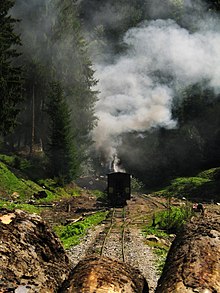Maramureş is a region in north-western Romania. The Romanian part of the historical Maramureş is a rather small region consisting of Maramures County and Satu Mare County.
Cities
edit- 1 Baia Mare — a mostly unsightly city across a mountain range from true Maramures; the largest transportation hub into Maramures.
- 2 Satu Mare
- 3 Sighetu Marmaţiei — the center of the "real" Maramures on the border to Ukraine
- 4 Breb — a village which is a great example of true Maramures culture. The only village with budget travel infrastructure.
- 5 Cavnic — former mining town, now a developing ski resort
- 6 Vişeu de Sus — starting point of the famous Vaser Valley Forestry Railway
- 7 Borşa
- 8 Ieud — village on the Iza valley, home to two old wooden churches
- 9 Săpânța — the famous Merry Cemetery is here
Understand
editTalk
editMaramureș is a multicultural region. This part of the world was several times invaded by different powers. This is the reason why not only Romanian but also Hungarian and Ukrainian are widely spoken here. In the bigger cities and more important tourist attractions, you can get along with English pretty well, but you can have a more profound experience in this primarily rural area if you can travel with a native speaker and/or are able to understand at least the basics in one of the aforementioned languages.
Get in
editBy plane
editBy train
editTo Baia Mare there are four trains daily from Cluj, three trains from Bucharest and one train from Timisoara.
To Sighetu Marmatiei there are two direct trains from Cluj, one from Bucharest and one from Timisoara. Check timetables on cfrcalatori.ro[dead link].
There is also a cross border train from Hungary to Satu Mare, which has some carriages coming directly from Budapest; check for timetable on elvira.hu.
By bus
editThere are buses to Baia Mare from cities in Spain, France, Switzerland, the Czech republic and Hungary as well as from major cities in Romania. Check for timetables at autogari.ro and Eurolines
By car
editGet around
editBy bus
editBus is the most reliable way to get around without a car, but buses generally only go along main roads between larger cities, and smaller destinations are not officially listed as stops. For example, if one wanted to take a bus from Baia Mare to Breb, a small village between Cavnic and Ocna Șugatag, you will yield no results searching on autogari.ro for a connection even though getting on the bus and asking the bus driver to drop you at Breb is perfectly normal and ok.
By car
editEven the main roads in Maramures are poor, so be extremely careful. Also know that hitchhiking is very prevalent and you will probably be constantly inquired. This is a great way to make a bit of extra cash, but if you do not wish to just give them a downwards gesture with all your fingers from the steering wheel and they will understand.
By thumb
editHitchhiking in Maramures is extremely easy and prevalently done even by locals, although smaller roads of course have little traffic. It is expected to give a few lei in return for services. Note that thumbs up will get you nowhere here, though. Extending your arm and doing a sort of downwards gesture with your hand, almost like petting a dog, is the preferred way of asking for a ride. It's difficult to describe, but you'll see it everywhere.
See
edit


Maramureș is one of Europe's best kept secrets, the place where the time hasn't moved for decades, a place where the traditions, the wooden art and the human kindness are well preserved. Close to the Ukrainian border, Maramureș covers 3381 sq km of valleys, beautiful villages, hills and mountains (up to 2303 m high). On this small surface are preserved over 100 wooden churches (8 of them listed on UNESCO list), a natural reserve also protected by UNESCO, about 60 villages and small towns, the only narrow gauge industrial steam train still in use in Europe, and many other attractions.
The wooden churches
edit- 1 Church of the Presentation of the Virgin in the Temple, Bârsana.
- 2 Budeşti Josani church.
- 3 Saint Parascheva Church, Desești.
- 4 Church of the Archangels Michael and Gabriel, Plopiș.
- 5 Saint Parascheva Church, Poienile Izei.
- 6 Ieud Hill Church.
- 7 Church of the Archangels Michael and Gabriel, Șurdești.
- 8 Church of the Holy Archangels, Rogoz.
- The tallest wooden church in the world (78 m high, erected at Sapanta, between 1995-2003).
Museums
edit- 9 Oaș Land Museum (Muzeul Țării Oașului).
- 10 Rogoz Ethnographic Museum (Muzeul Etnografic Rogoz).
Other
edit- Pietrosu Rodnei Natural Reserve, UNESCO listed since 1979, established in 1932, part of the "Rodna Mountains National Park", protecting edelweiss, gentians, marmots, chamois, etc.
- Maramures Mountains Natural Park, the largest and wildest in Romania, covering 1480 sq km, protecting 1260 plant species, bears, wolves, lynxes, etc.
- Sârbi Village, group of water powered machines (fuling and watermills, thresher, alcohol distilleries, whirlpools).
- Budești Village, the best preserved traditional Maramureș settlement.
- 11 Horses Waterfall (Cascada Cailor) (at Baia Borșa, you can go up by the ski lifts - operating in the summer as well and visit it with a short walk).
Do
edit
Take the Vaser Valley Forestry Railway from Vișeu de Sus.
Eat
editDrink
editHorinca, Ţuică - strong (>50% alcohol) double distilled fruit brandy easily available throughout the region and almost exclusively home distilled
Stay safe
editGo next
edit- the Bucovina if you feel like visiting more historical churches and sedate villages
- Cluj-Napoca in the heart of Transylvania as a vibrant university city

